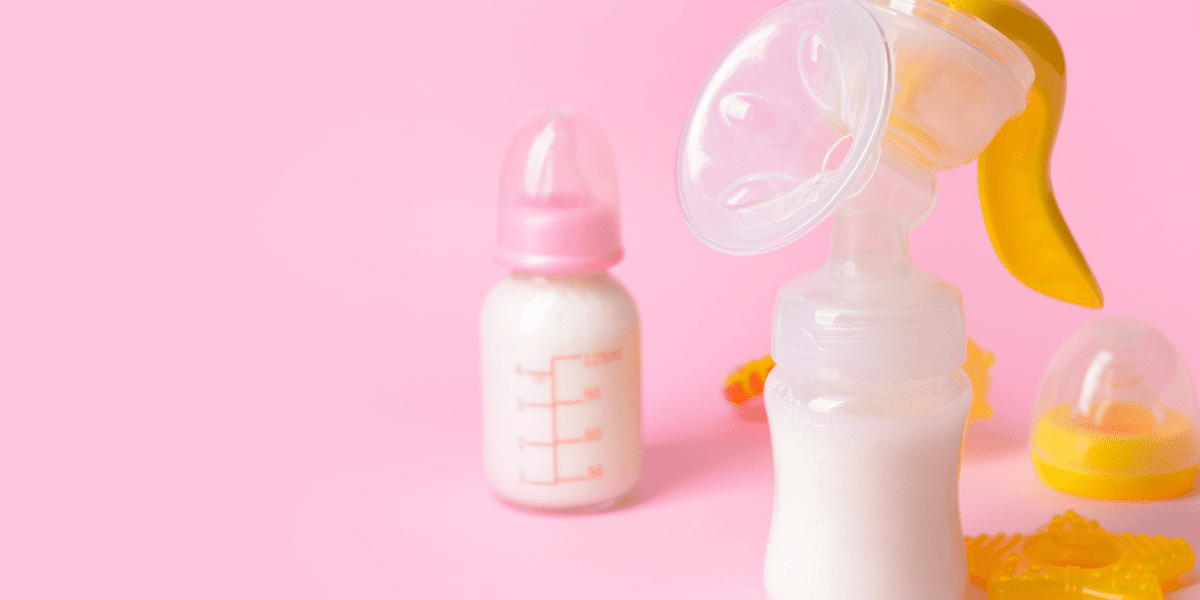It can be distressing, tiring and difficult to be a new parent, especially when dealing with your baby’s inability to state their needs. New parents find themselves often becoming in-tune and sensitive to what their child wants and when they want it in an impressive way, but it is not unusual for you to not understand what your baby wants.
It is often a matter of crossing off what the issue could be until your baby is feeling better, and it is not a failing that you cannot figure that out just yet. Just keep trying and be easy on yourself.
If your baby is unlatching and crying, do not panic or worry. It is a natural part of your baby’s growing to occasionally struggle with these regular routines, so just breathe deeply and think about what the different causes could be.
As an Amazon Associate, I earn from qualifying purchases. The links below may be affiliate links. Please read my disclosure policy for more information.
Baby isn’t latching on properly

Your baby’s failure to be able to latch onto your chest properly can be the initial issue, even if they seem to be latching on initially. It can be hard for them to get a grip and a solid feed from the nipple, so try to create the best circumstances for them to be able to do so.
Feed your baby when they are awake, ideally calm, and before they have reached the peak of their hunger. Although counter-intuitive, if your baby is distressed and very hungry, latching can be harder than ever because of their crying.
To avoid this, try looking out for some cues that they may be getting hungry.
Babies that are hungry may begin rooting. This is a reflex that babies are generally born with, where if you stroke on their cheek near their mouth, they will often turn in the direction of the touch and open their mouth ready to be fed.
Although you can stimulate this reflex from your baby, if they do so readily and repeatedly in response to stimuli it may be a sign that they are hungry.
Your baby may also suck on objects, their lip, tongue, or even materials like your shirt. They may stick their tongue out, open their mouth wide, lick their lips or smack their lips together.
Your baby may also wake up from their sleep, and fuss in a sign of light distress if they are starting to hunger. Crying tends to be a fairly late-stage sign of hunger in babies, so there are other things you can look out for first.
If your baby is not rooting onto the breast well, express a few drops of milk onto the breast or bottle to entice the baby to latch on. This may work because your baby may smell or taste the milk and readily start feeding.
Your baby may also be struggling to latch because of their comfort, straining or access, so consider switching positions, or moving the baby to another breast if you are feeding them with your milk.
The milk flow is too much

Problems with milk flow do not just stem from a lack of milk, but too much milk as well. Babies can struggle with too much milk or a flow that is too quick if they are positioned in such a way that they get overwhelmed.
You may be able to identify this problem by observing when your baby begins to cry in the first place.
If your baby tends to unlatch and cry in the mornings, the problem may be that your chest is engorged with milk from the long night. As a consequence, the milk is flowing very readily into your babies mouth and they are becoming overwhelmed with a flow that is too quick for them to feed easily.
If you are expressing your milk too quickly for your little one to keep up, your baby may be coughing, gagging or pulling away during feeding. Unlatching may be because they need to catch their breath or dislike dealing with the overflow of milk.
Additionally, if they are gulping the milk quickly, it is possible they are swallowing a lot of air. Gassiness is also a contributor to babies unlatching from the chest, so this is an important factor to consider.
To deal with this, there are a few approaches you can take to resolve the problem. The first can be to express your milk before your feed, so that the milk flows less readily and is more manageable for your child.
To avoid wasting milk if you can or need to, pumping your milk and then storing it for use can be a great way to both resolve your problem and preserve some of your milk for later.
Additionally, babies are less likely to become overwhelmed with a flow if you lay back when nursing. This means that babies will be sucking most of the milk out as opposed to it expressing freely due to gravity, so your baby should be able to feed as much as they want to without worrying about an overflow due to letdown.
If your baby’s unlatching is due to gassiness, or you simply cannot rule it out, burp them regularly as you feed them and afterwards as well. This should prevent them from fussing or struggling to latch on due to gassiness.
Lastly, you may consider taking breaks during feeding. Disrupting your baby’s feeding may make them fussier in the moment, as taking away a child’s food source is always going to cause distress and unrest in them: but this may allow them to properly swallow and digest the milk, and avoid them being overloaded with milk.
The milk flow is too little

In contrasting, if your baby is struggling with feeding more in the evenings, it may instead be that milk is being released from your breast too slowly in the night where you have milk that is expressed less readily. This may cause your baby to unlatch and begin to cry.
There are a number of approaches you can try to ease your baby’s distress in this situation.
Before feeding, consider stimulating the flow of milk from your breast by hand. Apply gentle pressure or a fingertip at the bottom or lower part of your breast where it meets your torso, swooping up towards your nipple in a clean stroke.
This motion will help stimulate your let-down reflex, which is the signal your body needs to begin producing milk readily. Hand express a couple drops of milk before you start, or use a pump if you have one to help the reflex get going.
Once you have achieved a steady flow, offer your chest to your baby and begin feeding again.
A warm hand towel, compress or cloth can also stimulate your let-down reflex. Ensure it is not warm, but not hot.
Place it on your chest before your baby begins feeding, and take it off when you start. It should help your body more readily express milk.
Massaging can also help your body during this process, both before you begin and while your child is feeding to help the milk flow easily.
If you notice your baby fussing during a feed and think they may unlatch, consider squeezing your breast to provide a small amount of extra milk. If the issue is an uneven or low flow, this should help your baby keep feeding and stay attentively at the breast.

Although it may seem unintuitive if you have been struggling with feeding your baby, try to encourage them to feed until they are satiated.
Babies that are struggling to get enough milk at the breast may fall asleep before they have had their fill, leading to not just less nourishment than they need but more unrest in the future, more hunger, and more difficulty expressing milk for you.
This is because when your baby feeds more, you express milk more easily: if your baby is stopping early due to the long process of feeding, you may find feeding them more difficult in the future.
Lastly but still vitally important is that of formula feeding for your baby. Although much shame is passed around about the idea of formula feeding, it is vastly superior to feed your child formula milk than to provide less nourishment to your child in general.
Moreover, you are much more likely to be a better parent to your child with proper rest and less worry. Whatever you decide to do, whether that is formula feeding or not, your choice is the right one. It is your body and your child.
Your baby is growing

Growth spurts are a natural part of your baby’s growing, and will accompany an increased demand for milk with their growth as well. Following that, their desire for milk will have grown more than the milk you are expressing.
It is common for your body to catch up with this increased demand with time, but in this period your child may readily fuss and be distressed with their desire for more nourishment.
Periods where growth spurts are commonly experienced are at 2 weeks, 3 weeks, 3 months and 6 months, though more in between is completely normal as well. Their sleep may be disrupted as well during these times.
The answer to this generally is that these times will involve some catch up for your baby’s growth. If your milk cannot keep up with your baby’s increased demand in this time and you are concerned about their hunger, do not feel shame about compensating with formula milk.
This can be a better choice than not feeding your child this extra milk as they grow. Remember that any milk is great milk for a growing baby, and you do not need to feel shame about whether it comes from the breast or not.
Your baby is developing

Babies, like adolescents, do experience changes in their feelings and moods as they grow up. Developing will involve them experience new sensory inputs, observing their environment differently, and even just experiencing new moods.
In particular, your baby may be more curious and distracted. As someone feeding the baby, they may be looking for more milk or unlatch frequently.
Their fussing may be difficult to deal with, and they may cry.
Babies at this time will generally settle down as their development levels out. They should feel better with time, and the best thing you can do is ensure they are well-fed by whatever means you have.
In the meantime, try to accommodate for your baby’s developmental changes by feeding in a quiet room. Try to avoid noise or movements, and try to keep the company to just you and your baby for the best results.
Your baby need to burp

Although innocuous, it can be difficult when babies pull away from the breast and cry. That said, it can be as deceptively simple as that they need to burp.
Some babies just need to be burped more than other babies, including during feedings, and in particular bottlefed babies have less regulated air when feeding and need to be burped more often. This is normal, especially if your baby is hungry and is feeding very eagerly.
To address your baby’s needs, stop the feed gently and try to burp them. If you continue to try to feed, they can end up swallowing extra air which can make their gassiness worse and cause them further distress.
Burping your baby just to be sure during the feed will ensure the feed goes well, and do consider burping afterwards. If you don’t want to disturb your baby’s continuous feed, try to burp when switching breasts or when your baby unlatches naturally.
To avoid this gassiness is not always possible: however, a good way to prevent an over-eager feed from your baby can be to look out for hunger cues to prevent them from reaching a high state of hunger. This includes rooting, lip smacking, sucking objects or just general distress.
Remember, there are a variety of other reasons that babies can struggle while feeding and unlatch. Sometimes that can be a want to suckle idly with no milk (a pacifier or finger can help), that they are full, teething, or prefer one of your breasts for reasons of plentitude and flow.
Something to look out for is thrush on your baby’s mouth, or if they have a cold and are struggling to latch because they need to breathe. A healthcare provider can help you diagnose these issues, but do not worry.
They are easily resolved, and your baby should soon be feeding as normal.

